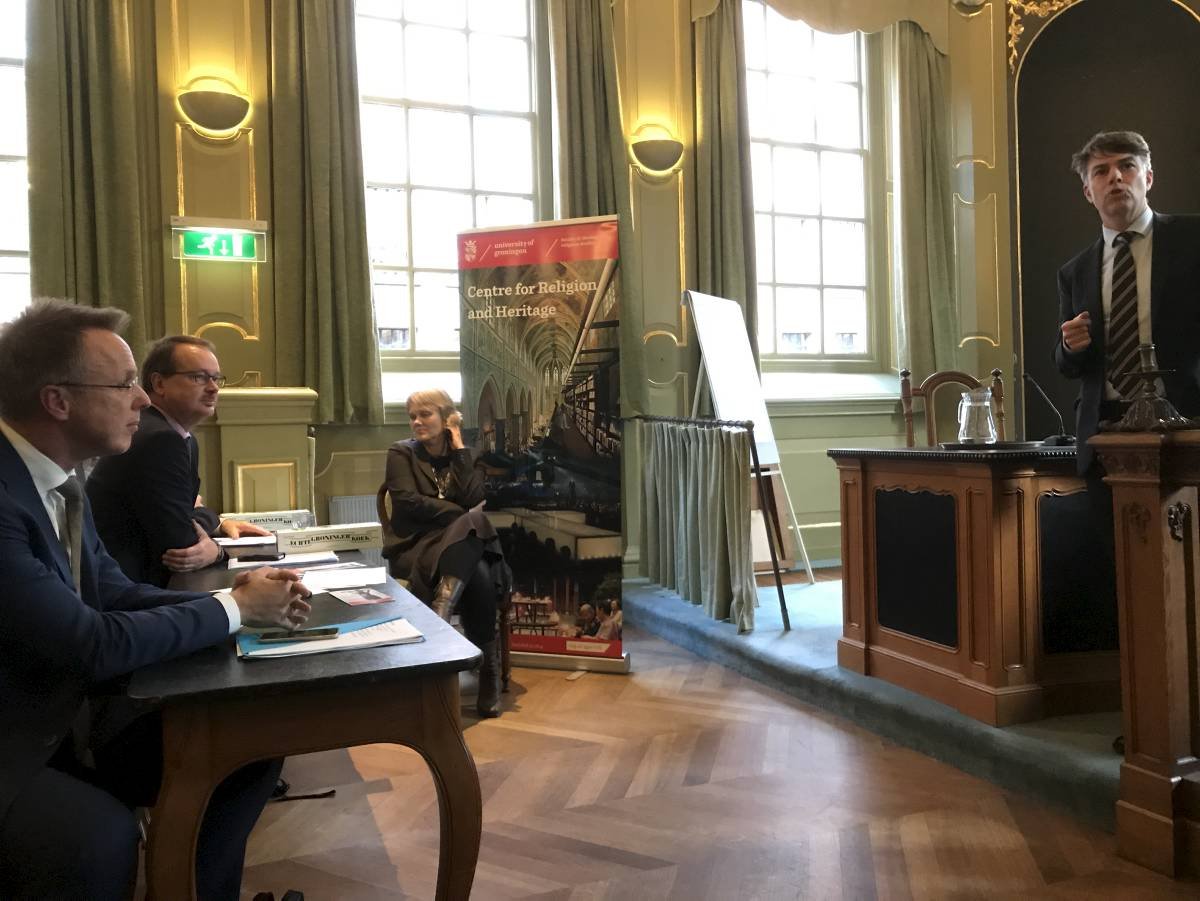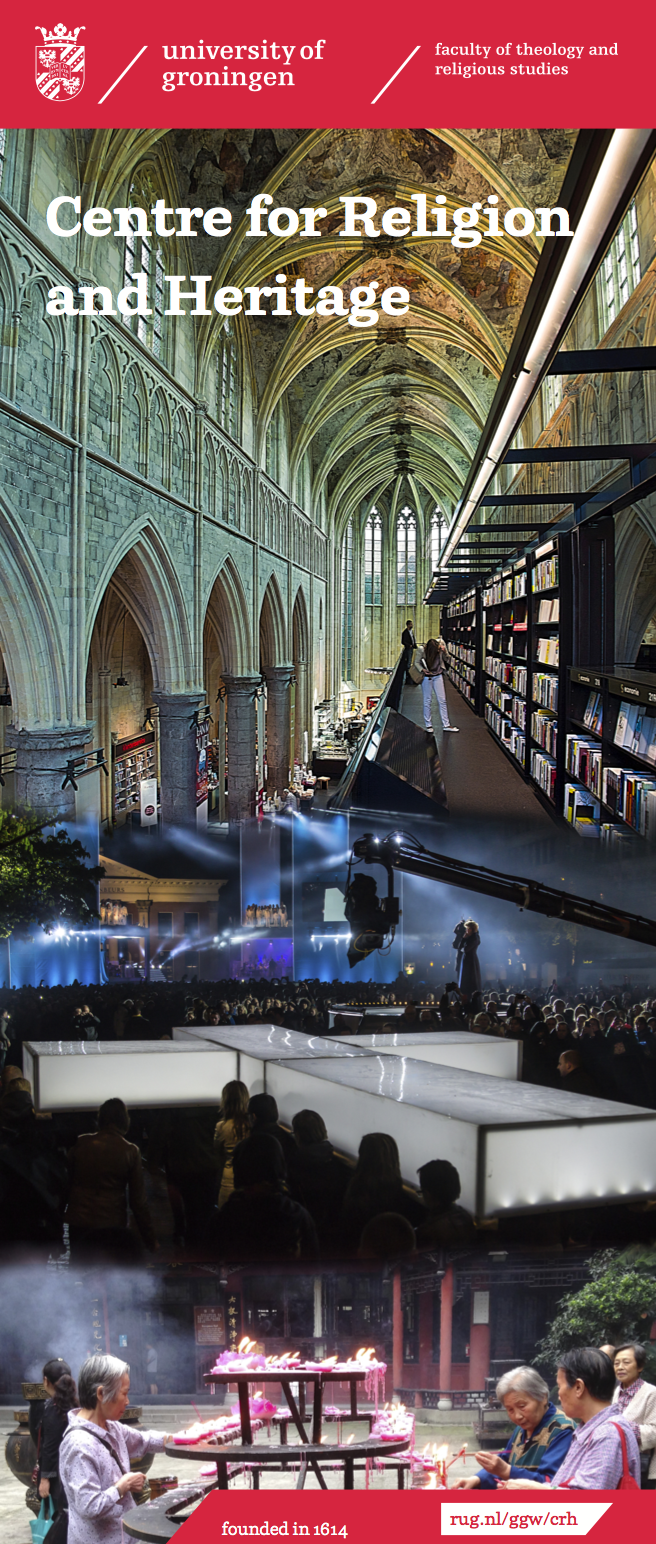By Todd Weir, Director
On 25 October, we officially launched the Centre for Religion and Heritage (CRH) of the University of Groningen with the participation of F.J. Paas, the King’s Commissioner in Groningen. The Former Courtroom at the Faculty of Religious Studies and Theology in Oude Ebbingstraat was filled to capacity with students and scholars, but above all with representatives of the leading Dutch heritage organizations and museums. This was a testimony to the urgent need for scholarly focus on the issue of religious heritage in the Netherlands.

On the picture René Paas, Dr Mathilde van Dijk and Prof. Todd Weir. Image RD
In the opening remarks, I laid out a vision for the Centre as a research hub that integrates professional training through a new master’s program and collaborates with those government offices, churches, museums and foundations that are grappling with the challenges facing the Netherlands. The CRH is the successor of the Institute for Christian Cultural Heritage, which has contributed to heritage work in the Netherlands over many years. The new Centre will extend its research beyond Christian heritage to include ancient, Islamic, Jewish and Buddhist religious history. It will also examine the relationship of heritage to new forms of religion and to secularism.
As a theme for the day’s event, we chose ‘Religious Heritage in a Secular Age’, given our conviction that the secularization of Dutch and European society is creating an urgent need for scholars of religion to bring their expertise to bear on the problem of heritage. In the Province of Groningen, the dramatic shrinkage of church attendance meant that more and more Groningers experience religion as heritage rather than as living tradition.
In his keynote address the renowned British Church historian, Hugh McLeod described how our current secular age was born abruptly in the transformation of religious practice in the 1960s. The young Utrecht scholar, Ernst van den Hemel followed up with a look at the politics of heritage today. He cautioned his listeners to look carefully at what was being sold as religious heritage in the political realm. Citing his analysis of over 400K tweets by Dutch nationalist parties, he found, for example, that talk of “Judeo-Christian” culture was rarely about Judaism or the practice of Christianity and nearly always a preface to anti-Islamic claims.

Following presentations showcasing the innovative research that postgraduate students are undertaking in the field of heritage, representatives of leading Dutch heritage organizations entered into a roundtable discussion. These included Emile Schrijver of the Jewish Historical Museum, Gerhard Bakker of the Foundation for Historic Frisian Churches, Suzan Folkerts of the Athenaeum Library, Michiel Verweij of the government Office of Cultural Heritage, and Jaap Broekhuizen of the Protestant Church of the Netherlands. These speeches revealed a consensus regarding the need for action and greater understanding in field of religious heritage in contemporary Netherlands. One recurrent theme of the day was how future church vacancies represent both a challenge and an opportunity. They are a challenge because the government expects an upturn in the number of vacant churches. However, they also represent an opportunity, because the need to find appropriate uses for these churches can help push Dutch society to explore new ways to connect to their religious past. With some imagination, the need to fill old churches with new meaning may also offer a way of integrating new religious communities in the physical fabric of Dutch towns and cities.
The day closed with an inspiring speech by the King’s Commissioner in Groningen. Addressing directly the need to find new uses for ancient churches, F. J. Paas called for pragmatic but creative and fitting solutions. Overall, Paas’ remarks contributed to the expectation that the new Dutch government coalition will make religious heritage a priority. The Commissioner’s speech chimed in with the overall impression made by the ceremony in the Old Court Room. The event was not merely a formal opening of a new academic institute, but rather an expression of an awareness shared by government, churches, heritage organizations and scholars alike that there is not only a growing need for action in the field of religious heritage, but also the collective will to do so.
On the part of the CRH, let me close this introduction by saying that we welcome opportunities to work with colleagues in heritage organizations across Europe. Please feel free to contact me at t.h.weir@rug.nl.
For more information, you can visit the centre’s official website and Facebook page.
Todd Weir is Professor of History of Christianity and Modern Culture at the University of Groningen. Prior to his move to the Netherlands in 2016, Todd taught history for nine years at Queen’s University Belfast. His first book Secularism and Religion in Nineteenth Century Germany: The Rise of the Fourth Confession(Cambridge) won the 2016 Jacques Barzun Prize for Cultural History. His next major research project will be a transnational history of the term “worldview” from 1790 to the present. He is also working on a project on the relationship of heritage and interreligious dialogue.





Follow us: